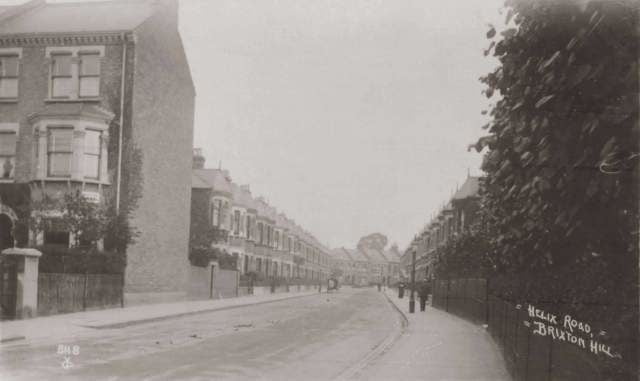Vivian Steven

These are excerpts from a manuscript entitled “Thoughts and recollections of a septuagenarian nonentity” written in 1983 by Vivian Steven, who died in 1998. The manuscript was passed on to the Friends of Windmill Gardens by his son Anthony.
Living arrangements
My father died in 1910 when I was about four…My grandfather – mother’s father – must have died about the same time, and apparently it was decided that mother and grandmother should live together, which of course was sensible. My mother had of course to find a job, first with the Army and Navy Stores book department and subsequently with Foyles, who then had a branch in Brixton. I think her wage was about 30/- weekly.
When mother and grandmother came to live in the same household they moved from Medora Road to nearby Helix Road, letting off the top flat in the latter house. This house was large enough to let off part – about nine rooms – and had been built in the 1890s. I think my mother paid about £350 for the house, and the construction throughout was of Victorian excellence, mahogany newel posts, tiled front and hall – all in fact built to last. These houses are now selling for about £30,000 or so.
Derby day
On Derby day and other times when racing was held at Epsom a cluster of children would gather at the bottom of Brixton Hill, and as the returning coaches came by – both motor and horse-drawn – the cry would go up “Throw out yer mouldies!” This was supposed to charm the returning race-goers into throwing out any spare coppers they might have, but I cannot recall any single occasion when this actually happened.
School
I must have started at school about 1911, but have no recollections of this. The school was called a ‘council school’, just known as New Park Road School…My grandmother must have had to take me there until I was old enough to go on my own. One main road had to be crossed, Brixton Hill. Now a roaring stream of traffic, then nothing more than a kind of country lane, with horses labouring up the slight incline, and coming down with wheels locked by a chain and getting so hot that the wooden part of the wheel would smoke and smoulder. To my young eyes this hill seemed enormously steep; now of course cars rush up without changing gear.
Entertainment
There were two theatres in Brixton at that time. One was called the Brixton Theatre and the other the Empress. The former we visited once a year for the Christmas pantomime, and at the Empress we saw many National Sunday League concerts. The Brixton Theatre has been gone many years now, and at the Empress I think they have boxing or bingo.
There were then several cinemas in Brixton, and at one by the town hall we could get in for a few pennies on Saturday mornings to see the old silent films such as Pearl White, Exploits of Elaine, etc. These were mostly serials and could end up with the heroine tied to the railway lines, or in some similar predicament, so the next week’s visit was a must.
Also at about the same time there was a tank in Brixton, opposite the town hall on a piece of vacant ground – gone now due to road widening. This was to promote the sale of the first issue of National Savings Certificates. These cost 15/6d, and if kept for five years £1 was returned.
The First World War
The opening of the Great War in 1914 did not make a great impact on me, especially as there was no man in the immediate family, although a cousin on my father’s side of the family was killed in France. However, as the war went on I became increasingly interested, and I remember that in school we had maps marked with coloured pins showing the ebb and flow of the front.
I can still vividly recall the zeppelin raids. They seemed to fly rather low and followed the line of Brixton Road and Brixton Hill, tossing out, by hand I suppose, the occasional small bomb. I also remember a daylight attack by German aeroplanes, Gothas I think they were. I could see the anti-aircraft shells bursting amid the raiders but no hits were scored.”
Street traders
On Sunday afternoons we would sometimes hear the odd street singer with his rather doleful songs, and the equally mournful sound of a tin whistle. We usually rewarded these performers with a few coppers thrown out. On rarer occasions the cheerful clangour of a barrel organ could be heard, often with a poor shivering monkey perched on the top of it. Needless to say the sight of the monkey encouraged us to be more generous.
Other Sunday callers would be the ‘muffin man’ and the ‘watercress man’ – when these commodities were in season. They both wore a kind of flat-topped cap and carried their wares on a tray. The muffin man had a bell and the watercress man relied on the power of his lungs.
On weekdays the catsmeat man came, and if his customers were out the skewered meat would be pushed through the letter box, eagerly pounced upon by the cat if it was in.
Also during the week we had a visit from an old man and woman who pushed a small handcart selling rock salt and disinfectant. The salt was sawn off a block, and for 6d one’s own bottle could be filled with a black tarry stuff, as thick as treacle, which when diluted would make gallons of very good disinfectant.

